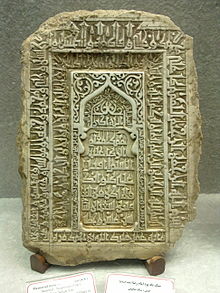
Back آية الولاية Arabic Vilayət ayəsi Azerbaijani Aleya de Wilayah Spanish آیه ولایت Persian Verset de Wilayah French Аят Вилаят Russian Wilayahversen Swedish Velayet Ayeti Turkish
| Part of a series on |
| Islam |
|---|
 |
| Quran |
|---|

The verse of walaya (Arabic: آيَة ٱلْوَلَايَة) is verse 5:55 of the Quran, the central religious text of Islam. This verse specifies three authorities as the only sources of walaya for Muslims. In Sunni Islam, walaya in this context signifies 'friendship' or 'support', whereas Shia Muslims interpret it as 'spiritual authority' because of its exclusivity.
The first two authorities listed in the verse are God and the Islamic prophet Muhammad. In some Sunni sources, the third authority is all Muslims, whereas Shia sources identify the third authority in this verse as Ali ibn Abi Talib, cousin and son-in-law of Muhammad, citing the occasion of its revelation. In Shia Islam, this verse thus sanctions the spiritual authority of Ali over all Muslims, after God and Muhammad, and supports his (usurped) right to succeed the prophet. Other Sunni sources link this verse to Ali but reject any Shia implications.
© MMXXIII Rich X Search. We shall prevail. All rights reserved. Rich X Search